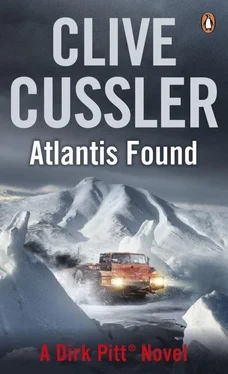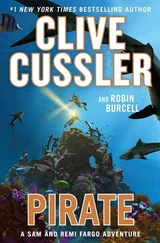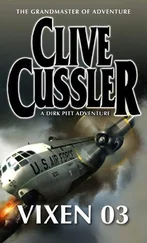"What if she came up against a crevasse too wide for her to drive over?" inquired Giordino.
"Thomas Poulter, the cruiser's designer and builder, came up with an ingenious innovation. The big wheels and tires were positioned close to the center of the body, which left an overhang front and rear of eighteen feet. The wheels were capable of retracting upward until they were level with the underside of the body. When the driver came to a crevasse, he lifted the front wheels. Then the rear-wheel traction pushed the forward section over the crevasse. Once the front wheels were safe on the opposite side, they were lowered. Finally, the rear wheels were retracted and the front then pulled the cruiser to the other side. A very ingenious system that actually works."
"Where did you find sixty-year-old gears that would fit the reduction unit?"
"The unit, or transmission, was not the only one built. We analyzed the problem and how to fix it before we came down here. The original manufacturer is still in business and had a bin of old parts buried deep in their warehouse. Fortunately, they had the gears we needed to make the necessary changes."
"Have you tested her yet?" asked Giordino.
"You've arrived at an opportune moment," replied Dad. "In the next hour, we hope to run her out onto the ice for the first time since she came to rest in 1940, and see what she can do. And just in time, too. Another couple of weeks and the ice floe would have broken and carried her out to sea, where she would have eventually sunk."
"How do you intend to transport her back to the States?" asked Giordino.
"I've chartered a small cargo ship that is moored off the ice shelf. We'll drive her across the ice, up a ramp, and onto the ship."
"If she performs according to expectations," said Pitt, "can we borrow her for a couple of days?"
Dad looked blank. Then he turned and stared at Cash. "He's joking."
Cash shook his head. "He's not joking. These men desperately need transportation to the Wolf mining facility."
Dad squinted at Pitt as he refilled his wineglass. "I should say not. By the time I'm finished, I will have spent over three hundred thousand dollars to pull her out of the ice, restore her to running condition, and transport her back to the Smithsonian in Washington. When I first discussed my dream of saving the vehicle, everyone laughed at me. My crew and I dug under the worst weather conditions imaginable. It was a major feat to lift her back to the surface again, and we're all damned proud. I'm not about to hand her over to a couple of strangers who want to go joyriding around the ice pack."
"Trust me," said Pitt earnestly. "We're not going for a joyride. As bizarre as it sounds, we are trying to avert a worldwide catastrophe."
"The answer is no!"
Pitt and Giordino exchanged cold looks. Then Pitt removed a small folder from the breast pocket of his arctic survival coat and pushed it across the table at Dad. "Inside, you will find several phone numbers. They list, in order, the Oval Office of the White House, the Joint Chiefs of Staff at the Pentagon, the chief director of NUMA, and the Congressional Security Committee. There are also names of other important people who will back up our story."
"And what, may I ask, is your story?" Dad asked skeptically.
So Pitt told him.
AN hour and thirty minutes later, Dad and his crew, along with Frank Cash, stood and watched silently as the big red vehicle, belching a black cloud of exhaust into the crystal blue sky, lumbered across the frozen landscape toward the horizon.
"I never got Dad's name," said Pitt, as he sat hunched over the steering wheel, gazing through the windshield and studying the ice field ahead for cracks and obstacles.
Giordino stood behind Pitt in the Snow Cruiser's confined chart and control room, studying a topographical map of the ice pack. "The name on an envelope that was sticking out of his pocket read 'Clive Cussler.' "
"That is an odd name. Yet it sounds vaguely familiar."
"Whoever," said Giordino indifferently.
"I hope I didn't step into a minefield when I promised to bring back his off-road vehicle in the same condition he loaned it to us."
"If we put a scratch on it, have him send the bill to Admiral Sandecker."
"Got a heading for me?" Pitt asked.
"Where's your GPS unit?"
"I forgot it in the rush. Besides, they didn't have a Global Positioning System in 1940."
"Just head that way," Giordino said, pointing vaguely into the distance.
Pitt's eyebrows rose. "That's the best you can do?"
"No directional instrument ever created can beat an eyeball."
"Your logic defies sanity."
"How long do you think it will take to get there?" Giordino asked.
"Sixty miles, at only twenty miles an hour," Pitt murmured. "Three hours, if we don't run into any barriers in the ice and have to detour around them. I only hope we can get there before the assault team. A full-scale attack might force Karl Wolf to slice off the ice shelf ahead of schedule."
"I have a sour feeling in my stomach that we won't be as lucky sneaking in here as we were at the shipyard."
"I hope you're wrong, my friend, because a lot of people are going to be very unhappy if we fail."
The sun blazed from an azure blue sky, its intensity tripled by the reflection off the crystallized surface as the big red Snow Cruiser crawled over the freeze-dried landscape like a bug over a wrinkled white sheet. Veiled by a gossamer of snow, she trailed a light haze of blue from her twin diesels' exhaust drifting in the air. The huge wheels crunched loudly as they rolled over the snow and ice, their crude crosscut tread gripping without slippage. She moved effortlessly, almost majestically, as she was meant to do, created by men who had not lived to see her fulfill their expectations.
Pitt sat comfortably straight in the driver's seat, and gripping the buslike steering wheel, drove the Cruiser in a straight line toward a range of mountains looming far off to the horizon. He peered through heavily polarized sunglasses. Snow blindness was an ominous threat in cold climates. It was caused by conjunctiva inflammation of the eye by the sun, whose glare reflected a low-spectrum ultraviolet ray. Anyone unlucky enough to suffer the malady felt like sand was being rubbed in their eyes, followed by blindness that lasted anywhere from two to four days.
Frostbite, though, wasn't a hazard. The heaters in the Snow Cruiser kept the cabins at a respectable sixty-five degrees. Pitt's only small but irritating problem was the constant buildup of frost on the three windshields. The window vents did not put out enough air to keep them clear. Though he drove wearing only an Irish-knit wool sweater, he kept his cold-weather clothing nearby, in case he had to leave the cruiser for whatever emergency might rear its unwelcome head. As beautiful as the weather looked, anyone familiar with either pole knew it could turn deadly in less time than it took to tell about it.
When added up, more than a hundred and fifty deaths had been recorded in Antarctica since exploration had begun, when a Norwegian sailor on a whaling ship, Carstens Borchgrevink, had become the first man to step ashore on the continent in 1895. Most were men who had succumbed to the cold, like Captain Robert Falcon Scott and his party, who'd frozen to death on their return trip after trekking to the South Pole. Others had become lost and wandered aimlessly before they died. Many were killed in aircraft crashes and other unfortunate accidents.
Pitt wasn't in the mood to expire, certainly not yet- not if he and Giordino were to stop the Wolfs from launching a frightful horror on mankind. Besides manhandling the Snow Cruiser over the ice shelf, his first order of business was to get to the mining facility as quickly as possible. His handheld GPS was of no use. The geographic display on Pitt's unit was incapable of showing his exact position within a thousand miles of the pole. Because the satellites that relayed the position belonged to the military, who had not planned on conducting a war in Antarctica, they were not in orbit over that part of the globe.
Читать дальше












